Conference Communiqué: The Mission of the Eastern Catholic Churches in the Life of the Universal Church and for the Modern World
Sunday, 08 March 2009, 00:24 March 4-6, 2009 - The International Theological Institute (Internationales Theologisches Institut) in Gaming, Austria, in cooperation with the Institut für Theologie und Geschichte des Christlichen Ostens, Katholisch-Theologische Fakultät der Universität Wien and the Ukrainian Catholic University (Lviv), hosted an international symposium on the mission of the Greek Catholic Churches in Central and Eastern Europe...
March 4-6, 2009 - The International Theological Institute (Internationales Theologisches Institut) in Gaming, Austria, in cooperation with the Institut für Theologie und Geschichte des Christlichen Ostens, Katholisch-Theologische Fakultät der Universität Wien and the Ukrainian Catholic University (Lviv), hosted an international symposium on the mission of the Greek Catholic Churches in Central and Eastern Europe...
 March 4-6, 2009 - The International Theological Institute (Internationales Theologisches Institut) in Gaming, Austria, in cooperation with the Institut für Theologie und Geschichte des Christlichen Ostens, Katholisch-Theologische Fakultät der Universität Wien and the Ukrainian Catholic University (Lviv), hosted an international symposium on the mission of the Greek Catholic Churches in Central and Eastern Europe. Among the 150 participants were 17 bishops (15 Greek Catholic), numerous priests, leading scholars, students, and laypersons from over 20 countries. The conference program was based on common prayer and reflection animated by critical analysis of the history and contemporary life of the Greek Catholic Churches. German, English, and Italian were the official languages of the conference, but some ten languages were used in the liturgical celebrations, presentations, and dialogue. The discussions were enriched by the interventions of the hierarchs representing the courageous ecclesial experience of Christians who withstood persecution to preserve their mission and Greek Catholic identity in Communist times.
The symposium presentations and discussions focused on the contribution that the Eastern Catholic Churches of Central and Eastern Europe are called to make to the broader Christian community and the world at large. The speakers combined historical and theological (ecclesiological) methodologies and analyzed cultural, ethnic, and national factors in the past experience and future mission of Greek Catholics.
Despite the tragic twentieth-century history of totalitarian repression and centuries of discriminated status of their Churches (praestantia ritus latini), the Greek Catholic hierarchs, clergy, and scholars from Austria, Belarus, Bulgaria, Croatia, Hungary, Romania, Russia, Slovakia, Ukraine, as well as the United States, reaffirmed that their Eastern identity and Catholic communion constitute a rich spiritual treasure - the very substance of a unique religious experience.
In a world in which black and white binary oppositions of a categorical “either/or” nature no longer are sufficient to explain or embrace the complexities of human experience, the conference constituted that the confessional and denominational division between “Orthodox” and “Catholic” have been ossified by an “either/or” approach. The Greek Catholic Churches refuse to be categorized in a manner that either lessens their Eastern identity or negates their Catholic communion. The participants renewed their commitment to the arduous task of living in the middle of a divided Christian world, hoping and working for its unity.
The urgent and life-giving vocation of the Greek Catholics is to integrate and synthesize the patristic, liturgical, canonical, cultural, and mystical tradition of the Christian East with a living witness to the catholicity and universality of the Gospel of Jesus Christ. In this regard, Eastern Catholics have much to offer to their Latin brothers and sisters. Roman Catholic participants of the conference, especially its convener, Christoph Cardinal Schönborn, reiterated the hope of Western Christians that Greek Catholics, as well as Orthodox, can help people in the West better experience liturgical beauty and holiness, offsetting a “flattened” sense of the sacred in a increasingly secularized post-Enlightenment world.
March 4-6, 2009 - The International Theological Institute (Internationales Theologisches Institut) in Gaming, Austria, in cooperation with the Institut für Theologie und Geschichte des Christlichen Ostens, Katholisch-Theologische Fakultät der Universität Wien and the Ukrainian Catholic University (Lviv), hosted an international symposium on the mission of the Greek Catholic Churches in Central and Eastern Europe. Among the 150 participants were 17 bishops (15 Greek Catholic), numerous priests, leading scholars, students, and laypersons from over 20 countries. The conference program was based on common prayer and reflection animated by critical analysis of the history and contemporary life of the Greek Catholic Churches. German, English, and Italian were the official languages of the conference, but some ten languages were used in the liturgical celebrations, presentations, and dialogue. The discussions were enriched by the interventions of the hierarchs representing the courageous ecclesial experience of Christians who withstood persecution to preserve their mission and Greek Catholic identity in Communist times.
The symposium presentations and discussions focused on the contribution that the Eastern Catholic Churches of Central and Eastern Europe are called to make to the broader Christian community and the world at large. The speakers combined historical and theological (ecclesiological) methodologies and analyzed cultural, ethnic, and national factors in the past experience and future mission of Greek Catholics.
Despite the tragic twentieth-century history of totalitarian repression and centuries of discriminated status of their Churches (praestantia ritus latini), the Greek Catholic hierarchs, clergy, and scholars from Austria, Belarus, Bulgaria, Croatia, Hungary, Romania, Russia, Slovakia, Ukraine, as well as the United States, reaffirmed that their Eastern identity and Catholic communion constitute a rich spiritual treasure - the very substance of a unique religious experience.
In a world in which black and white binary oppositions of a categorical “either/or” nature no longer are sufficient to explain or embrace the complexities of human experience, the conference constituted that the confessional and denominational division between “Orthodox” and “Catholic” have been ossified by an “either/or” approach. The Greek Catholic Churches refuse to be categorized in a manner that either lessens their Eastern identity or negates their Catholic communion. The participants renewed their commitment to the arduous task of living in the middle of a divided Christian world, hoping and working for its unity.
The urgent and life-giving vocation of the Greek Catholics is to integrate and synthesize the patristic, liturgical, canonical, cultural, and mystical tradition of the Christian East with a living witness to the catholicity and universality of the Gospel of Jesus Christ. In this regard, Eastern Catholics have much to offer to their Latin brothers and sisters. Roman Catholic participants of the conference, especially its convener, Christoph Cardinal Schönborn, reiterated the hope of Western Christians that Greek Catholics, as well as Orthodox, can help people in the West better experience liturgical beauty and holiness, offsetting a “flattened” sense of the sacred in a increasingly secularized post-Enlightenment world.
 In recent decades, in ecumenical dialogue, the Eastern Catholics have often been deemed to be a “problem”. The conference affirmed that an objectification and patronizing critique of the Greek Catholics as an ecumenical obstacle has reached a dead end. The miraculous revival and evident vigor of Central and Eastern European Greek Catholics cannot be explained in terms other than those of God’s will and bounty. It also suggests that discussions of unity without the Greek Catholics, stigmatized as the “uniates”, will generate no new answers to the questions of East-West religious reconciliation.
In a letter addressing the symposium, Cardinal Lubomyr Husar quoted statements of Pope Benedict XVI, which stressed that Greek Catholic Churches are called to be faithful to the Eastern tradition, to witness to it in the Catholic communion, thus being an example to Orthodox Christians of what living communion with the Catholic Church means. This communion has led to a multifaceted mutual enrichment of the Eastern and Western traditions. With humility and commitment, Greek Catholics recognize that through historical circumstance, cultural and social pressure, or lack of internal resolve, their Churches had in some cases allowed Western practices and mindsets to obscure or to displace ancient rites and spiritual traditions. Today, with the encouragement of the highest authorities in the Catholic Church, the recovery of authentic Eastern Christian identity is being actively fostered.
At the same time, the authenticity of Greek Catholic religious experience and practice is manifested by the new martyrs of the twentieth century. Greek Catholic bishops, clergy, monastics, and laity overcame the greatest moral challenges of the twentieth century: the suppression of God-given freedom and human dignity by ideological totalitarianisms. Greek Catholics have resisted compromise with oppressive regimes and emerged from persecuted clandestine experiences with moral authority and a demonstrated capacity to overcome untold hardships. It is the spiritual disciplines of the martyr Churches grounded in an unshakable faith in God’s providence that can provide the counter-cultural courage and methods of Christian life in a secularized post-Christian Europe facing the challenges of a globalizing consumerism, crass materialism, the negation of the gift of human life and the sacredness of the human person, and disintegration of the family.
The Greek Catholic bishops presented the pastoral concerns and priorities of their individual Churches. These presentations illustrated the specificities of each ecclesial experience while demonstrating that the Greek Catholic Churches of Central and Eastern Europe have many common challenges and seek to foster their common reflection and cooperation addressing as responsible the constituents of the Universal Church in the modern world.
Among the concrete proposals that received general support of the symposium participants were: 1.) to petition Pope Benedict to devote one of the upcoming Papal Synods to the topic of Eastern Catholic Churches; 2.) to continue annually the practice of conferences such as the one held at the International Theological Institute. The conference participants heartily commended Cardinal Schönborn and the ITI for the theoretical and practical commitment to family issues, including a genuine hospitality to Greek Catholic students with families and to married priests. In this regard, the family and the institution of the married priesthood in the Greek Catholic Church was considered as a possible topic for a future conference.
The participants reached a consensus that the Greek Catholics should not rest on the spiritual laurels of their martyrs. Rather, it is time for all Greek Catholics to roll up their sleeves and apply themselves with the faith of their fathers and mothers to the challenges of Christian witness and unity in the twenty-first century.
http://www.iti.ac.at/news/news_main.htm
In recent decades, in ecumenical dialogue, the Eastern Catholics have often been deemed to be a “problem”. The conference affirmed that an objectification and patronizing critique of the Greek Catholics as an ecumenical obstacle has reached a dead end. The miraculous revival and evident vigor of Central and Eastern European Greek Catholics cannot be explained in terms other than those of God’s will and bounty. It also suggests that discussions of unity without the Greek Catholics, stigmatized as the “uniates”, will generate no new answers to the questions of East-West religious reconciliation.
In a letter addressing the symposium, Cardinal Lubomyr Husar quoted statements of Pope Benedict XVI, which stressed that Greek Catholic Churches are called to be faithful to the Eastern tradition, to witness to it in the Catholic communion, thus being an example to Orthodox Christians of what living communion with the Catholic Church means. This communion has led to a multifaceted mutual enrichment of the Eastern and Western traditions. With humility and commitment, Greek Catholics recognize that through historical circumstance, cultural and social pressure, or lack of internal resolve, their Churches had in some cases allowed Western practices and mindsets to obscure or to displace ancient rites and spiritual traditions. Today, with the encouragement of the highest authorities in the Catholic Church, the recovery of authentic Eastern Christian identity is being actively fostered.
At the same time, the authenticity of Greek Catholic religious experience and practice is manifested by the new martyrs of the twentieth century. Greek Catholic bishops, clergy, monastics, and laity overcame the greatest moral challenges of the twentieth century: the suppression of God-given freedom and human dignity by ideological totalitarianisms. Greek Catholics have resisted compromise with oppressive regimes and emerged from persecuted clandestine experiences with moral authority and a demonstrated capacity to overcome untold hardships. It is the spiritual disciplines of the martyr Churches grounded in an unshakable faith in God’s providence that can provide the counter-cultural courage and methods of Christian life in a secularized post-Christian Europe facing the challenges of a globalizing consumerism, crass materialism, the negation of the gift of human life and the sacredness of the human person, and disintegration of the family.
The Greek Catholic bishops presented the pastoral concerns and priorities of their individual Churches. These presentations illustrated the specificities of each ecclesial experience while demonstrating that the Greek Catholic Churches of Central and Eastern Europe have many common challenges and seek to foster their common reflection and cooperation addressing as responsible the constituents of the Universal Church in the modern world.
Among the concrete proposals that received general support of the symposium participants were: 1.) to petition Pope Benedict to devote one of the upcoming Papal Synods to the topic of Eastern Catholic Churches; 2.) to continue annually the practice of conferences such as the one held at the International Theological Institute. The conference participants heartily commended Cardinal Schönborn and the ITI for the theoretical and practical commitment to family issues, including a genuine hospitality to Greek Catholic students with families and to married priests. In this regard, the family and the institution of the married priesthood in the Greek Catholic Church was considered as a possible topic for a future conference.
The participants reached a consensus that the Greek Catholics should not rest on the spiritual laurels of their martyrs. Rather, it is time for all Greek Catholics to roll up their sleeves and apply themselves with the faith of their fathers and mothers to the challenges of Christian witness and unity in the twenty-first century.
http://www.iti.ac.at/news/news_main.htm
LATEST NEWS

We can imagine what the prayer of the prisoners in the Russian torture centers in the Ukrainian Kharkiv region was like – Head of the UGCC on the 206th day of the war 17 September
A vast cemetery, a mass burial, was found near the city of Izyum, in which more than 400 innocently killed and tortured people have already been...
-
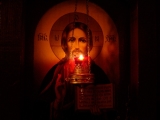 Глава УГКЦ у 158-й день війни: «Нехай Господь прийме з уст нашої Церкви псалми та моління за всіх тих, які особливо просять нашої молитви»
Глава УГКЦ у 158-й день війни: «Нехай Господь прийме з уст нашої Церкви псалми та моління за всіх тих, які особливо просять нашої молитви»
-
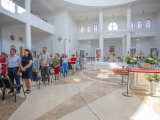 «Сила, яка походить із вірності Христові, є стержнем, який ніхто не може зламати», – Блаженніший Святослав
«Сила, яка походить із вірності Христові, є стержнем, який ніхто не може зламати», – Блаженніший Святослав
-
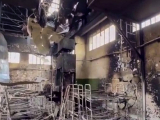 Глава УГКЦ у 157-й день війни: «В ім’я Боже ми засуджуємо звірства в Оленівці і світ повинен це засудити як особливий вияв дикості й жорстокості»
Глава УГКЦ у 157-й день війни: «В ім’я Боже ми засуджуємо звірства в Оленівці і світ повинен це засудити як особливий вияв дикості й жорстокості»
-
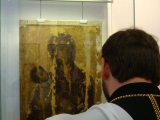 «Боже, почуй наш плач і поспіши нам на допомогу і порятунок!», – Глава УГКЦ у 156-й день війни
«Боже, почуй наш плач і поспіши нам на допомогу і порятунок!», – Глава УГКЦ у 156-й день війни
-
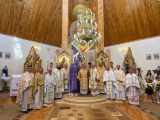 «Бог йому дав серце і душу українського народу»: відбулася щорічна проща до Прилбичів з нагоди уродин митрополита Андрея Шептицького
«Бог йому дав серце і душу українського народу»: відбулася щорічна проща до Прилбичів з нагоди уродин митрополита Андрея Шептицького
-
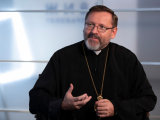 Глава УГКЦ: «Я горджуся українськими патріотами, які без найменшої краплі ненависті готові захищати своє»
Глава УГКЦ: «Я горджуся українськими патріотами, які без найменшої краплі ненависті готові захищати своє»
-
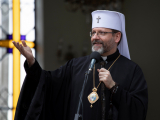 Блаженніший Святослав закликав українську молодь скласти присягу на вірність Христові
Блаженніший Святослав закликав українську молодь скласти присягу на вірність Христові
-
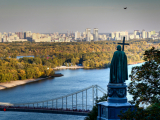 Глава УГКЦ у 155-й день війни: «Помолімося, щоб не втратити скарбу віри князя Володимира»
Глава УГКЦ у 155-й день війни: «Помолімося, щоб не втратити скарбу віри князя Володимира»
-
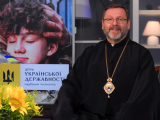 Блаженніший Святослав у День державності України: «Наша Держава – це для нас питання життя або смерті»
Блаженніший Святослав у День державності України: «Наша Держава – це для нас питання життя або смерті»
-
 Глава УГКЦ у 154-й день війни: «Нехай Господь Бог прийме у свої вічні обійми журналістів, які віддали за правду своє життя в Україні»
Глава УГКЦ у 154-й день війни: «Нехай Господь Бог прийме у свої вічні обійми журналістів, які віддали за правду своє життя в Україні»
-
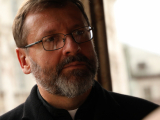 Глава УГКЦ у 153-й день війни: «Принесімо наш біль перед Боже обличчя і будьмо певні, що Він нас вислухає»
Глава УГКЦ у 153-й день війни: «Принесімо наш біль перед Боже обличчя і будьмо певні, що Він нас вислухає»
-
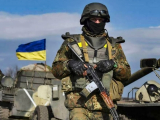 Глава УГКЦ у 152-й день війни: «Помолімся молитву заступництва за наших воїнів»
Глава УГКЦ у 152-й день війни: «Помолімся молитву заступництва за наших воїнів»
-
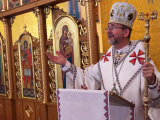 «Віруюча людина не може бути байдужою, коли бачить страждання іншої людини», – владика Богдан Дзюрах
«Віруюча людина не може бути байдужою, коли бачить страждання іншої людини», – владика Богдан Дзюрах
-
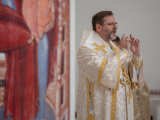 «Серед нашого страждання творімо простір для прояву Божої всемогутності», – Глава УГКЦ у 6-ту неділю після П’ятдесятниці
«Серед нашого страждання творімо простір для прояву Божої всемогутності», – Глава УГКЦ у 6-ту неділю після П’ятдесятниці
-
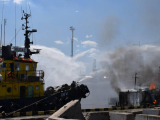 Глава УГКЦ у 151-й день війни: «Російське віроломство ми перемагаємо силою любові до нашої Батьківщини»
Глава УГКЦ у 151-й день війни: «Російське віроломство ми перемагаємо силою любові до нашої Батьківщини»

